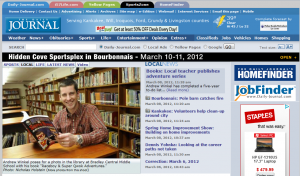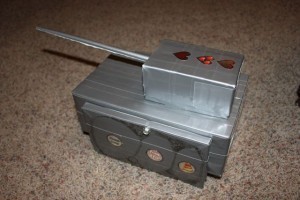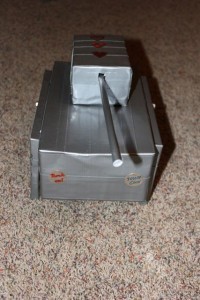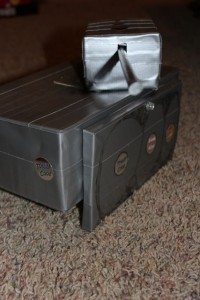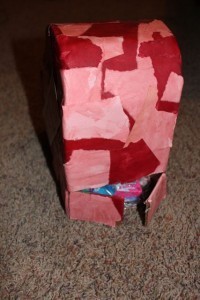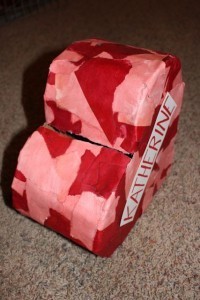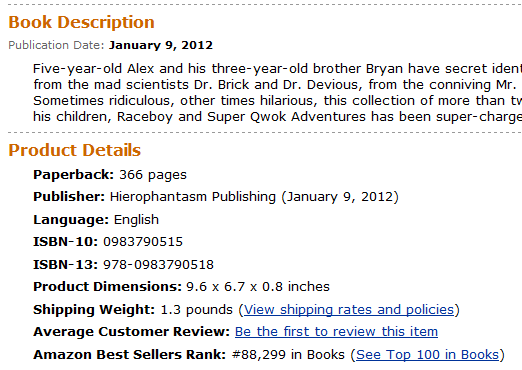Andrew Winkel's Blog, page 6
May 26, 2012
Grade Like the Government
The school year is drawing to a close, which means grades are due for my seventh graders. As is usually the case, I’m never happy with my grades. Well, not my grades, but the grades my students earn. Recently I’ve realized that the perfect model for grading isn’t used by teachers: it’s used by lawmakers when they complete their budgets. So here is what I propose for next year:
If a student isn’t passing my class, I can BORROW points from the points they will earn next quarter. This will allow the student to earn a passing grading on this grading period. Of course, this also means that the student will need to earn additional points next quarter to make certain the grade is a passing grade, but since that’s in the future, it’s not really a problem now, right?
What should I do about the end of the year grade? I can’t actually borrow points from the kids as they go into eighth grade because those points are in another teacher’s class. However, my government inspired solution can easily handle this. I will pass my grade point debt on to next year’s class. I will take, er, borrow points from their grades to make certain this year’s students can receive the grades they want. Everyone will be happy until next year, but then, I’ll just borrow from the next year and the next year and the next year. Until my principal enforces some kind of mandatory point repayment policy. He’ll sit my down and say, “Mr. Winkel, based on the numbers I’m seeing, you’ve been borrowing points from the next year’s classes for so many years that if you don’t start thinking about how you are going to catch up, you won’t be able to. Here are some guidelines you need to follow to begin repaying the grade point debt you’ve accumulated.”
He will show me persuasive actuarial tables, and I will make an effort during one out of every six years or so the actually meet his point repayment plan for me. But in the end, it will simply be too important for my current kids to have the grades they want, and I’ll just put it off some more.
I know that you know that I know that this kind of borrowing isn’t sustainable forever. After all, I graduated from college a couple of times. Here’s the dirty little secret: I’m going to put off that inevitable breaking point as long as I can, and when I’ve finally borrowed so many points from future classes that I can’t ever possibly hope to repay them, when I’ve got to face the idea that the next ten years of my students are going to have F’s in order to pay back all those points I borrowed, I am going to retire.
Unless I don’t have a pension. Since the State of Illinois borrowed it. And hasn’t met their repayment schedule…
May 3, 2012
Kankakee Fantasy-con, Here We Come!
Chris and I will have a table at Kankakee Fantasy-con this year on June 9th. We’re looking forward to the opportunity to hang out with people who love comics, maybe do some comic shopping, and, of course, discuss Raceboy and Super Qwok Adventures. At the very least we’ll have a fun day talking with people, and at the very most we might actually sell a couple copies of the book.
April 27, 2012
A New Challenge
Both of you who follow this blog (okay, both is an exaggeration) have probably noted that I’ve been lax in posting since Raceboy and Super Qwok Adventures was published. And you might think that this is because I am working on yet another groundbreaking project that will change the lives of people everywhere (although everywhere is, again, exaggeration). Actually, this is not the case. The truth is I haven’t been able to finish anything. The true truth is that I haven’t been able to start anything. I’ve just been spinning my mental wheels and turning in circles and bumping into walls.
One of the walls I bumped into resulted in an idea that has been blooming in the fields of my mind, taking shape, coming into focus, growing clearer from the moment it arrived unbidden. It is not an idea for a new Raceboy and Super Qwok Adventure. Instead, it is a very personal project. Here is the kernel:
Even writers who self-publish seek assistance from their peers during he publishing process. They meet with writing friends to discuss their outline, or they share excerpts of their draft with online peers for edits. A friend may create the cover, or they may acquire an image from a website that captures the idea of the book. In a hundred ways a self-published book may actually be the result of a collaborative effort between the author and his friends and family. With a book published by a traditional publishing house, this collaborative synergy is compounded by editors, proofreaders, graphic artists, copywriters, and typographers, all of whom work together to craft a final project that is greater than the initial concept created by the author.
The idea that I had is simply this: To create a book that has had zero input from anyone else at any point from its creation to its composition to its proofreading to its typesetting to its book design to its publication. 100% me. I control everything. I’m to blame for everything. It seems like every book I read has an acknowledgements page where the author thanks all his friends for the suggestions to help keep the story laser sharp, or a thank you to a librarian who helped dig up the details of the time the Confederate cannons began their onslaught on the third day of the Battle of Gettysburg (I think Shelby Foote reported it as 1:07 p.m.).
I want to create a project where the acknowledgement page reads simply, “A big thank you to me for coming up with the inspiration for this project. And I also spent a great many hours offering suggestions to myself on how to improve the story. My editing skills, while probably imperfect, were vastly better than this project would have been if I hadn’t shown up. I’d also like to thank the team of me and me who put together the look of this book and really made it stand out for my readers. And a final thank you to me for believing like the vain narcissist that I am that this project could matter to anyone in the world except me.”
The more I think about a project like this, a sort of literary biosphere experiment, the more appealing I find the idea of attempting to carry it out. I do have a story idea that I don’t think I’ve every had anyone else read. It’s a concept I’ve been meaning to revisit for over a decade. Oddly enough, I think the story itself is thematically congruous with the concept of inclusiveness, justifying the means to the end.
I may have more to say on this subject after a couple of days of thinking through what direction I may be going with it. I should point out to both of my readers that summer is coming, and that’s when I’ll really have the time to attack it full force.
April 24, 2012
An Analysis of Annabel Lee by Edgar Allan Poe
I discussed the poem Annabel Lee by Edgar Allan Poe with my seventh grade classes, and we had lively discussions about it. The conventional–and typical–interpretation of this poem is that it is a love poem inspired by Poe’s dead wife. My interpretation is different, however. I’ve tried to find another interpretation like mine, and failing, have decided to explain what I think.
Firstly, I want to point out that I am not going to write this as a research paper. I will have no sources other than the poem itself and my own thoughts. Additionally, I begin with the knowledge that Poe composed the poem after his wife’s death. Any specifics about his or her age, cause of death, etcetera, will not come into this explanation because I do not believe them relevant.
One of the most challenging features of Annabel Lee is something that I’ve intuited but never felt the need to articulate, namely:
A fiction writer is understood to take up the role of a narrator, which may differ from his or her own perspective. A poet, on the other hand, is presumed to simply be revealing his or her own biographical feelings in the poem. In short, a poem like Annabel Lee is doubly challenging because it contains both a fictional narrative and a fictional narrator.
Since Annabel Lee is in the public domain, I can begin with the text of the poem itself. Note that Poe actually indents the even lines of his poem, but WordPress enjoys stripping any spaces from the code, and I’m not willing to try to spend hours trying to figure out how to force it to add three extra spaces to every other line of this poem.
Annabel Lee
By Edgar Allan Poe
It was many and many a year ago,
In a kingdom by the sea,
That a maiden there lived whom you may know
By the name of Annabel Lee;
And this maiden she lived with no other thought
Than to love and be loved by me.
I was a child and she was a child,
In this kingdom by the sea,
But we loved with a love that was more than love—
I and my Annabel Lee—
With a love that the wingèd seraphs of Heaven
Coveted her and me.
And this was the reason that, long ago,
In this kingdom by the sea,
A wind blew out of a cloud, chilling
My beautiful Annabel Lee;
So that her highborn kinsmen came
And bore her away from me,
To shut her up in a sepulchre
In this kingdom by the sea.
The angels, not half so happy in Heaven,
Went envying her and me—
Yes!—that was the reason (as all men know,
In this kingdom by the sea)
That the wind came out of the cloud by night,
Chilling and killing my Annabel Lee.
But our love it was stronger by far than the love
Of those who were older than we—
Of many far wiser than we—
And neither the angels in Heaven above
Nor the demons down under the sea
Can ever dissever my soul from the soul
Of the beautiful Annabel Lee;
For the moon never beams, without bringing me dreams
Of the beautiful Annabel Lee;
And the stars never rise, but I feel the bright eyes
Of the beautiful Annabel Lee;
And so, all the night-tide, I lie down by the side
Of my darling—my darling—my life and my bride,
In her sepulchre there by the sea—
In her tomb by the sounding sea.
I want to take an alternate viewpoint of this poem and examine it from the premise that Poe was using an unreliable narrator. From this point on, when I refer to the poet, I will be referring to the fictional character who is recounting the events of the poem, not Edgar Allan Poe. I will refer to Poe by name when I mean Poe the craftsman who created this poem.
If the poet is unreliable, deciphering which pieces of the poem are factual, and which pieces are interpretations based on the poet’s flawed perspective is a balancing act. The unreliable narrator has a distorted perception of reality, and through that distortion, the reader must interpret what is real and what the poet believes.
The poem Annabel Lee gradually reveals stanza by stanza that the poet is not sane. Within each stanza the poet explains more of his distorted reality, allowing the reader to decipher that the madness was present all along. At the poem’s conclusion, the reader can look back over the poem to see that all of the unreliable hints left by the mad poet.
Stanza One
It was many and many a year ago,
In a kingdom by the sea,
The poet begins the poem with “It was many and many a year ago,” which is a close approximation of “Once upon a time,” or even, “A Long Time Ago in a Galaxy Far, Far Away…” This prepares the reader for Never Never Land, a comparable fairy tale landscape, or the green, green grass of the past.
That a maiden there lived whom you may know
By the name of Annabel Lee;
He describes Annabel Lee as a “maiden,” which is, by definition, a young girl, especially unmarried, or a virgin. That he does call her a maiden indicates that their relationship had not progressed to marriage, or he would likely have introduced her as his “wife.”
And this maiden she lived with no other thought
Than to love and be loved by me.
The poet also explains that the maiden, “lived with no other thought than to love and be loved by me.” Since it is the poet who makes this declaration (and not the maiden; we don’t discover until Stanza Three why the maiden can’t speak for herself), there are two conclusions we can draw from his statement:
The maiden really did live “with no other thought that to love and be loved by” the poet;
The maiden did not have these thoughts, but the poet believed that she did.
Stanza One is the beginning of the poem, and the reader has not had enough exposure to the poet to evaluate his reliability. Readers who assume that the poet is recounting his own true feelings or experiences in the poem will not doubt that the poet is honestly portraying the state of affairs. In contrast, readers who begin to question the reliability of the poet after reading the remainder of the poem must question the accuracy of his assertions.
Stanza Two
I was a child and she was a child,
In this kingdom by the sea,
But we loved with a love that was more than love—
I and my Annabel Lee—
With a love that the wingèd seraphs of Heaven
Coveted her and me.
The couplets introduce these concepts:
The poet and Annabel Lee were children in this once upon a time place;
the poet and Annabel Lee “loved with a love that was more than love”;
this love was so amazingly great that the angels in heaven were jealous of the lovers.
Most people read that the poet and Annabel Lee “loved with a love that was more than love” and assume simply that this line is hyperbole, or an exaggeration of the love the two shared. They do not even question the poet’s assertion, seemingly taking it for granted that a thing (or concept) can be greater than the thing (or concept) itself. But something by definition cannot be greater than itself. The formula 1 > 1 results in a logical error.
Add to this the very abstract and ultimately unknowable statement uttered in lines 11-12, when the poet declares that the angels of heaven are jealous of the love shared between Annabel Lee and the narrator. Such an assertion can be interpreted as either fact or opinion, as in:
The poet has knowledge of the heavens that gives him access to the motivations of divine beings.
The poet’s opinion is that the angels of heaven were jealous of the love shared by the lovers.
I’m going to go out on a limb here and point out that my experience in life has left me slightly ignorant of the sublime. Indeed, most people I know (and even the most religious among them) are equally ignorant of the sublime. Therefore, the first point can be discounted.
This leaves us with the interpretation that the poet was expressing an opinion when he declared that the angels were jealous. Since people vary in the way they deal with grief, it is not unlikely to assume that the poet has decided to pin the blame for his love’s loss on the divine instruments, God’s angels. What has driven the poet to angels is unclear, especially since he may as well go all the way to the big guy. After all, God is the one who directs the angels much like a toddler with his toy cars. Indeed, by focusing his attention on the angels, he’s giving God a pass, and this purposeful omission appears to be the poet’s way to blame God without blaming God.
Stanza Three
Within this stanza the poet adds two pieces of information to his tale. First, he reinforces the angels’ culpability by saying, “This is the reason” though he doesn’t yet acknowledge the angels as divine hitmen:
And this was the reason that, long ago,
In this kingdom by the sea,
A wind blew out of a cloud, chilling
My beautiful Annabel Lee;
Second, the “highborn kinsmen” of Annabel Lee take her away and shut her up in a sepulchre by the sea:
So that her highborn kinsmen came
And bore her away from me,
To shut her up in a sepulchre
In this kingdom by the sea.
Probably the most telling element of this stanza is that the poet reveals through his explanation that he is not in any way responsible for Annabel Lee’s body. Her kinsmen are. This supports his earlier statement of Annabel Lee as a maiden. She is a minor, then, a dependent whose elders take care of her after her death. Keep in mind that his reliability is questionable, so the behavior of others in this case supports the statement that she was a maiden, and we can accept it now more readily.
Stanza Four
The angels, not half so happy in Heaven,
Went envying her and me—
Yes!—that was the reason (as all men know,
In this kingdom by the sea)
That the wind came out of the cloud by night,
Chilling and killing my Annabel Lee.
The poet’s accusation that the angels are divine hitman incapable of accepting such pure love on earth is a restatement of his assertion from Stanza Three; however, in Stanza four he goes further by attempting to legitimize this accusation when he explains that since everyone knows it, it must be so. I’ve already explained my doubts about the poet’s access to sublime knowledge; I’m equally suspicious about his access to the knowledge of his fellow men, which means his “as all men know” argument is equally faulty. I interpret this as self-deception: he has convinced himself that angels killed Annabel Lee and tells himself that “all men know” this to be the case. We don’t have “all men” to substantiate the poet’s declaration; instead, we have the poet who is increasingly unreliable.
The cause of Annabel Lee’s death, according to the poet, is that “the wind came out of the cloud by night, / Chilling and killing my Annabel Lee.” What makes this line interesting is that it could be the most truthful line in the entire poem. Annabel Lee could have died from exposure to cold air; she could have developed pneumonia; there are probably many possible methods of dying from exposure. What is telling about the poet is that he then takes this cold air killer and connects it with the divine, identifying it as the will of angels who seek to end Annabel’s life.
Stanza Five
But our love it was stronger by far than the love
Of those who were older than we—
Of many far wiser than we—
And neither the angels in Heaven above
Nor the demons down under the sea
Can ever dissever my soul from the soul
Of the beautiful Annabel Lee;
The poet reveals his strong love, far stronger than the love experienced by others, which is why it can’t be split by either angels or demons.
It is a misapprehension of either innocence or madness to assume that what you yourself experience differs from every other person who has ever existed. It’s the perennial teenage argument, “You just don’t understand,” when the reality is that it is the teenager who just doesn’t understand, who speaks from ignorance and assumes everyone else is not equally ignorant, but more ignorant.
One part of aging is to get past the egocentric assumption that the rest of the world cannot connect to your experiences. The poet has never passed to true maturity, since the loss of Annabel Lee has left him emotionally crippled at the same level of emotional maturity as he was when he lost her. After all, the poet introduces the poem with the line, “It was many and many a year ago.” Meanwhile, he remains (all these years later) as certain as ever that no one can appreciate his lost love, that no one can understand, because no one has ever experienced such a loss.
Stanza Six
The final stanza of Annabel Lee is a knock-out. But Poe doesn’t just put it in one solid jab; he throws a rapid right-left combo before the main thrust. Observe:
For the moon never beams, without bringing me dreams
Of the beautiful Annabel Lee;
We accept this as believable. Certainly a lost love will visit her lover’s dreams as he mourns her death.
And the stars never rise, but I feel the bright eyes
Of the beautiful Annabel Lee;
The creep factor should have set in with the words, “I feel the bright eyes.” I recognize only two possible interpretations for this line:
The poet is reaching out with his own fingertips to “feel the bright eyes / Of the beautiful Annabel Lee”; or
The poet can “feel” the admittedly dead Annabel Lee looking at him. This is the more likely of the two, since it indicates that the poet feels a connection to the dead Annabel Lee as she observes him despite the gulf between the two.
Here’s the final punch:
And so, all the night-tide, I lie down by the side
Of my darling—my darling—my life and my bride,
In her sepulchre there by the sea—
In her tomb by the sounding sea.
The poet reveals that he spends his nights within his dead love’s tomb at the side of her body. Poe waits, has the poet hold off on this admission until the conclusion of the poem because he wants his reader to look back over the rest of the poem and see it anew, see it in the light of a narrator willing to lay inside a sepulchre beside a dead body near the ocean. All previous stanzas are skewed after the poet admits he sleeps beside Annabel Lee even after her death.
In Conclusion
I believe Poe was really trying to create a disturbing poem that reveals gradually that the poet was unreliable and obsessed with a woman who may not have returned his love. The basic unreliability of the poet revealed in hints throughout the poem means that even as the poet claims Annabel Lee is his “bride,” a reader may not be able to believe that she was anything more than an obsession. We’ve all heard stories of Hollywood starlets beset by obsessive stalkers who need restraining orders; these maniacal lovers fill notebooks with fantasies, and live with the belief that the two are meant to be together for all time. I think Poe wanted to capture this monomania when he wrote Annabel Lee, portraying a creepy stalker willing to sneak into his dead love’s crypt because of his certainty that she wants to be with him even in death.
March 8, 2012
Kankakee Daily Journal Profiles Raceboy and Super Qwok Adventures!
Dennis Yohnka reported on Raceboy and Super Qwok Adventures in today's print edition of the Kankakee Daily Journal on page A3. It's a great article on the story of the book's origins.
I only had about ten minutes to talk to Dennis, and I was worried I didn't get to tell him enough. Actually, Dennis is probably lucky I only had about ten minutes to talk, because as Chris will tell you, I tend to babble grandiloquently (no, he wouldn't use that word, but he would use "babble") on subjects like "typographic ligatures," "em-dashes," and "e-Pub to Kindle conversion," which are just a few of the subjects I had to learn about to bring this book into the world.
The article was also featured on the Local section of the Journal's website, prominently showcasing my photo in the Bradley Central Library.
The website link (which may only link to an abridged version of the story) is here. No telling how long the link will be valid, or if it's a static or dynamic link.
The Daily Journal thoughtfully included a link for my parents to view and purchase three additional images from the photo shoot. You can view them directly here.
March 6, 2012
Reading: The REAL Super Power!
On Monday, March 5, 2012, Raceboy and Super Qwok Adventures had its official launch at the Clifton Community Building. It was important to me to have the library involved, since I am the Clifton Public Library's director. As a result, the event was sponsored by the library, but was held off-site at the Clifton Community Building.
Around sixty people showed up to purchase books or listen to the presentation. Probably twenty were children.


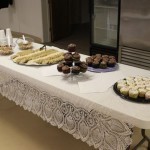
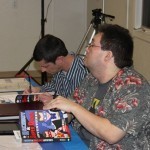

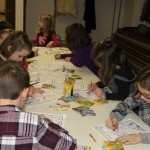

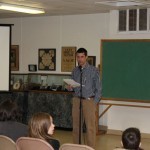
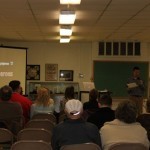
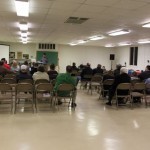
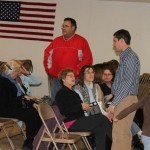
Chris and I signed books for about twenty minutes, then I gave a presentation about the origins of the book. Afterward I read "The Green Light" and "The Trouble with Tee-ball."
I think the event was a success. Sure, I'd love to say we sold every single book I had boxed and available, but the truth is, I enjoyed seeing all the faces who have visited me at the library over the years as they came out to support this event and support Chris and me.
Also, this reading was another of the many reminders I have been given recently about the importance of family and friends. I think one of the lessons that is embedded into the soul of Raceboy and Super Qwok Adventures is a reverence for family. I looked around at my family and friends and felt (and still feel) such a warmth as though they were buoying me with their good will.
My wife, Milissa, especially deserves credit for making the night a success. The refreshment table was entirely her doing, and it looked professionally catered. We had vanilla cupcakes, chocolate cupcakes, chocolate chip cookies, and oatmeal cookies. As you can see from the pictures, it was a remarkable spread.
The next stop of the Reading: The REAL Super Power Tour will be on Thursday, March 29th, 2012, when I will be reading at the Bradley Barnes and Noble to help out with Bradley East's Book Fair.
February 21, 2012
Valentine Boxes 2012
Those of you who read this blog have probably realized I'm chronologically impaired. While this article would have been an excellent choice of topics last week, I have once again decided to write about a topic after it would make sense to do so.
Why? The true answer is that I hadn't gotten around to taking photos of this year's valentine boxes and decided I'd better do it right now tonight before the boys destroy Alex's storing Legos.
Alex's Love Tank
Constructed from boxes salvaged from our recycling, disposable straws, duct tape, and some spare nuts/bolts/washers, we have a bonafide Love Tank.
The side boxes that make up the treads are actually valentine boxes from dollar store valentine cards. Although taped to the main box, I did add some spare bolts and nuts that were sitting around in the basement to make sure the boxes wouldn't fall off. The top box was a Pop-tart box that we cut in half and fitted back together and afterward wrapped with duct tape. Alex embellished the entire construction with valentine stickers. The turret swivels, attached to the main box with a bolt and nut and two 1″ washers (since the entire thing is built from cheap cardboard).
The swiveling turret reveals the trap door where the valentines can be placed.
Katherine's Heart
The best time to show you this box would have been while Katherine and I built it. But I didn't, so you're stuck with the end result.
This one used lots of school glue. Materials include scrap cardboard boxes, school glue, red and pink construction paper, and duct tape. And paint brushes, to spread the glue. It's basically a heart shaped box that is covered with paper mache.
The picture makes it look deceptively small. Actually, the circles were traced from a coffee can lid. The heart sits on either side and has a slit in the top middle for the valentine cards.
One side near the point has access flaps to retrieve the valentine cards or stash larger treats.
This final image shows a better view of the slit to deposit the valentines, though in this age of excess, most cards come with treats or candy that don't fit.
February 19, 2012
Reading: the REAL Super Power Tour
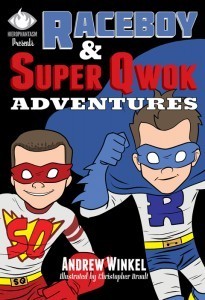 Chris and I are going to kick off our first reading/signing at the Clifton Community Building on Monday, March 5, 2012 at 6:00 P.M. The event will be sponsored by the Clifton Public Library.
Chris and I are going to kick off our first reading/signing at the Clifton Community Building on Monday, March 5, 2012 at 6:00 P.M. The event will be sponsored by the Clifton Public Library.
The theme will be Reading: The REAL Super Power!
Activities will include
a presentation on the super origins of Raceboy and Super Qwok Adventures;
author reading;
Q & A;
Book signing, and
Display of concept and final art.
February 11, 2012
R&SQA Breaks into Top 100,000 at Amazon!
At this exact moment, Raceboy and Super Qwok Adventures has broken into the 100,000 best selling books on Amazon.com.
Who knows where it will be tomorrow, but for today, at least, we can celebrate that there are only 88,298 books out of the millions of books Amazon has available for sale that sold better than Raceboy and Super Qwok Adventures. To give you some comparison, The Disappearance of Ichabod Crane is currently at 2,693,111 in sales rank.
BTW, ignore the Publication Date…Amazon doesn't have it right.
February 6, 2012
News will hopefully travel fast and far…
Data is beginning to filter through Amazon and Barnes and Noble. As I write this, here are some links for Raceboy and Super Qwok Adventures:
Currently Barnes and Noble is the only retailer who has pulled both the electronic text and the print version onto a single page.
Amazon hasn't pulled the data together for the two versions, so the Kindle version and the print version are currently separate.
The book is available through iTunes, though Apple doesn't have a specific link to the file.
I've also put together my Amazon author page.
And of course there's the official Hierophantasm page, which has links to Chris's artwork at DeviantArt.

